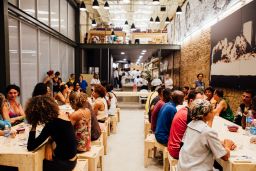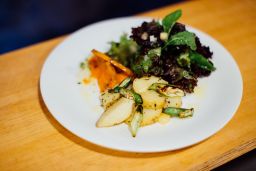Story highlights
Homeless Rio residents are eating Olympic surplus
Italian chef behind the culinary feast calls it a cultural project
The restaurant will serve the homeless until the Olympics wraps up
Within the invisible walls of an open kitchen, a small army is prepping for the evening’s dinner rush. Purple cabbage is rinsed in a colander, slabs of steak defrosted, plum tomatoes thinly sliced. As the staff zips from one station to the next, Italian master chef Massimo Bottura oversees the process, ensuring everything meets his high standards at his new Rio de Janeiro restaurant.
Want a reservation? You’ll have to wait. The VIP guest list for the “Refettorio Gastromotiva” is open exclusively to the city’s homeless population, who will be served piping hot meals made with surplus food supplies from the caterers of the 2016 Summer Olympic venues.
“We are serving 100 meals a day to homeless guests,” Bottura says, sitting in the restaurant’s ample dining room. “This is not a charity, this is a cultural project.”
A cultural project that has brought some of the world’s top culinary, art and architecture names to Rio this month.

“On the second night, there were two guys who left the room saying [it] was the first time they were treated like human beings– like princes and princesses,” Bottura says. “It’s breathtaking because it is exactly what we want to do here. We want to build the dignity of the people.”
Italian chef and Brazilian entrepreneur team up
The Michelin-starred “Osteria Francescana” chef teamed up with Brazilian entrepreneur and fellow chef David Hertz to bring the project to the Olympic host city. Hertz explains one of the project’s main goals is to reduce food waste.
“Some of the products we use may not sell at the supermarket because they are ugly or maybe a bit riper,” Hertz says, picking up a green pepper. “We don’t care if they are ugly, we know how make the most out of these ingredients.”

The industrial space was inaugurated on August 9th. Located in the heart of Rio’s bohemian Lapa neighborhood, where people are often found sleeping on the streets near the area’s iconic white arches and samba bars, the space was donated by the city government. The art curated by artist Vik Muniz and the unvarnished wooden tables designed by the Campana Brothers.
“The touch has to be perfect, but with no varnish because you have to see the traces of what was the dinner of the first night, the second night, the third night and on and on,” Bottura says, showing the stains of plate marks on the table. “You touch the wood, you see the history of this place.”
According to municipal officials, roughly 5,500 people live on the streets of Rio. Researchers and NGOs who work in the area believe this number has nearly doubled since the statistics were last published in 2013.
‘I have to give back to people’
At least two people who were served at the Refettorio have now been hired to help in the kitchen with cooking and cleaning. Others are students from Gastromotiva, Hertz’s vocational training school, which provides culinary training to people throughout Brazil who come from low-income families.
“We are chefs, we are considered the best chefs in the world so what we can do for the young generation is teach them, show them, give them examples, pass our heritage to them,” Bottura says. “We are bringing our knowledge here, we are sharing with these guys and we are trying to convince them that there is another world.”
Once the Olympic festivities wrap up this weekend, Refettorio Gastromotiva will open its doors to the paying public for lunch. Bottura says this money will be used to continue to finance the gourmet soup kitchen’s dinners.
“It’s going to be very affordable but we want the whole community to come here to sustain this project, because it is a social project and we need to add as many people as we can,” Bottura says. “I’ve just been rated best restaurant in the world – what more do I want from life? I have to give back to people.”
